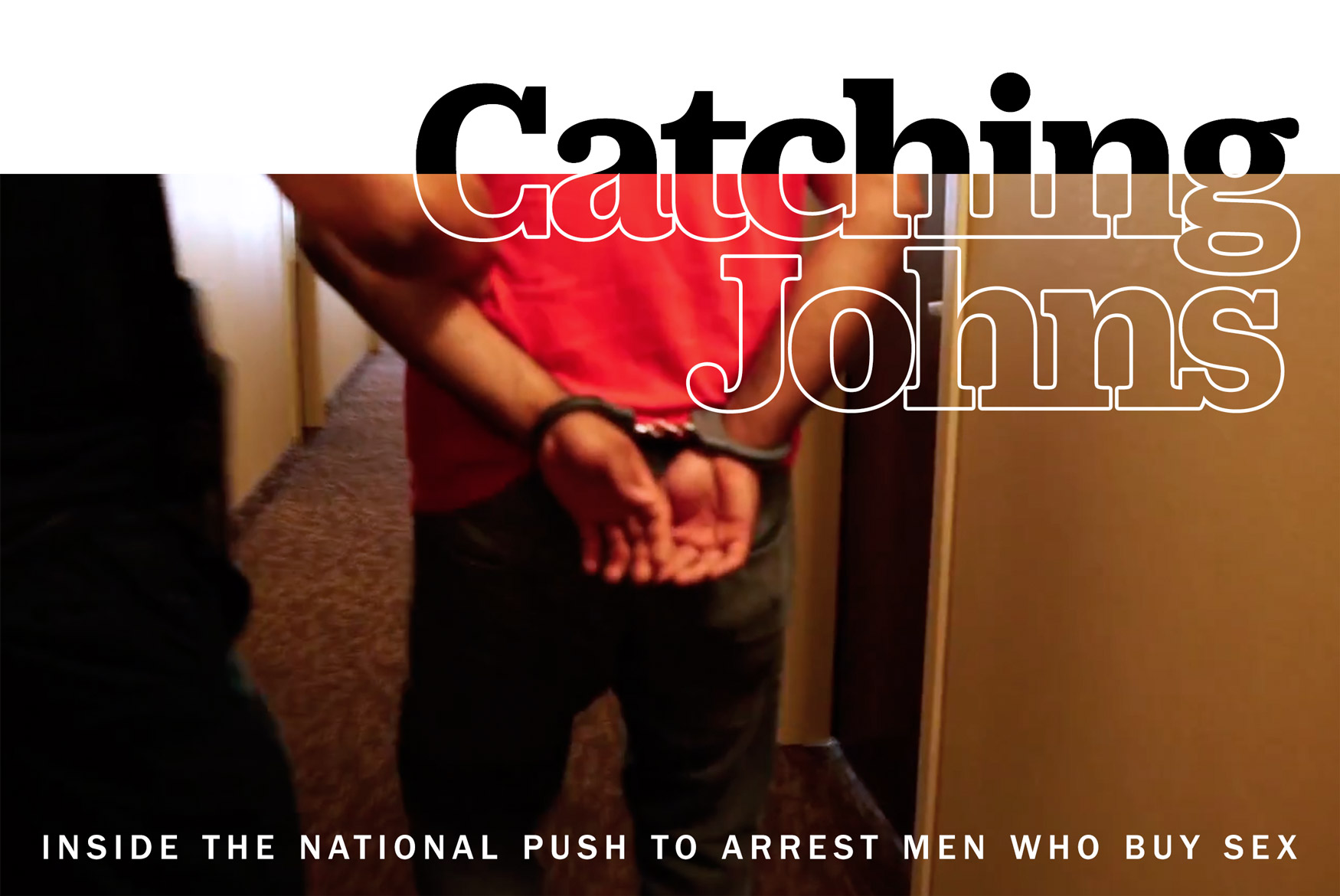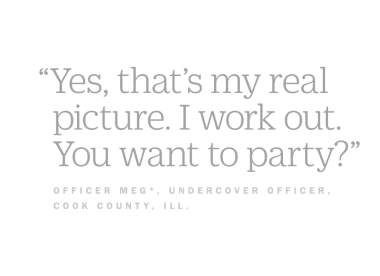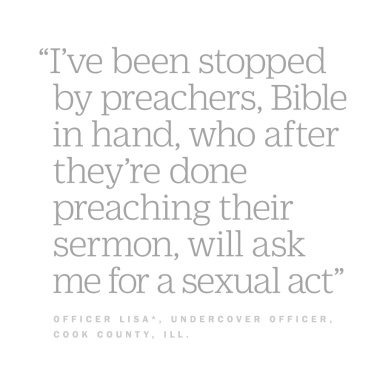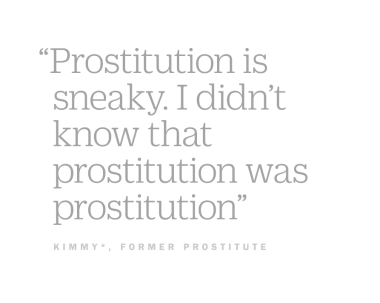
Story by Charlotte Alter
Videos by Diane Tsai
Cook County / Ill.
*Some names have been changed to protect the safety of the individuals involved.
It’s rare to see a grown man cry. But in a cigarette-scented hotel room near a Chicago airport, more than a dozen men come and go with wet cheeks and quivering lips. No one had died, no national tragedy had occurred— they had just been caught trying to buy sex.
Across the country, cops are implementing a strategy that has long been debated in Europe: targeting the men who buy sex while trying to help the women who sell it. Some police and scholars say that focusing law enforcement attention on sex buyers reduces demand for prostitution, which strangles the sex industry and curbs human trafficking. But some human rights organizations, most recently Amnesty International, advocate for the decriminalization of all aspects of sex work, including buying sex.
While Amnesty International members were considering whether to recommend decriminalizing sex work altogether, I was with a TIME video team on two buyer-focused sex stings in Cook County, Ill. We thought it would be like an adrenaline-pumping episode of Law & Order SVU, but we were wrong. Sex stings aren’t glamorous—they’re grim windows into the loneliness and desperation that motivates some men to grasp at the sexual cornucopia they think they are owed. Watching guys get caught is like watching that fantasy get destroyed over and over.

How One County is Targeting Men Who Buy Sex
The men are all different races and ages, from all walks of life– the only thing they have in common is shock. Some sit motionless with their hands over their eyes. One, a man so wide cops needed two pairs of handcuffs to arrest him, sat on the bedspread shaking his head slowly. Another expressed incredulity at his arrest, arguing that cops should be going after rapists and child molesters instead. All of them were slapped with a citation and a fine for buying sex on Sheriff Tom Dart’s turf.
The Cook County Sheriff’s Office, led by Tom Dart, has been the driving force in a national push to make it harder for pimps to sell sex and johns to buy it. Until recently, most jurisdictions in the U.S. have focused their energy on arresting prostituted women— according to records from the Department of Justice, more than 43,000 women were arrested for prostitution-related offenses in 2010, compared to just over 19,000 men (this number includes johns, pimps, and male sex workers). But since 2011, Sheriff Dart’s office has organized the “National Day of Johns Arrests,” now re-named “National Johns Suppression Initiative,” a series of stings coordinated with other jurisdictions over the course of several weeks, aimed at encouraging a permanent change in police practices.
Dart’s office now arrests just as many johns per year as sex workers, and with a radically different agenda— while clients are hit with a ticket and fine that can reach $1,300, sex workers are arrested and then offered counseling and job training through the Sheriff’s Women’s Justice Program, which is run by sex trafficking survivors. 60% of the money collected from johns’ fines goes to support the Women’s Justice Program, the other 40% goes to juvenile justice programs. Cook county does johns stings year-round, but the national initiative happens a few times a year.
I went along with Dart’s team on two stings: one in a hotel, one on the street. It’s important to note that all genders buy and sell sex, and trans people are often over-represented in the sex industry because of workplace discrimination elsewhere. But in this case, I observed women as sex workers and men as buyers, so that’s how I’ll describe it here.

Our first sting starts in an anonymous hotel room near a Chicago airport. The bedspread smells like old cigarettes and the air conditioner is acting up. Our room is filled with burly cops in baseball caps and T-shirts, badges hung around their necks, watching TV and joking around. In the room across the hall are female undercover officers dressed as sex workers. A hot pink tank-top, leopard print leggings. Only a few hours earlier, they had placed ads on a site called backpage.com advertising sex— already, guys are calling them looking to meet up. “Yes, that’s my real picture,” says Officer Meg*, twirling her hair as she talks on the phone. “I work out. You want to party?” Her colleague, Officer Lisa*, says she sometimes gets asked “‘what do your tits look like? What does your ass look like?’”
When a client arrives at the hotel, the undercover officers text their colleagues to make sure everyone’s out of the hall. The cops gather by the door, looking through the keyhole and waiting for a sign from the undercover officer. For a few seconds, all joking stops, and everyone is absolutely silent. Once a deal has been made for sex, the undercover officer gives an electronic signal and the other cops rush in and cuff the buyer. The whole process usually takes under a minute. (To protect the safety of the undercover officers, we’ve agreed to use pseudonyms.)
After they’re cuffed, the johns are quickly taken to a third room, where they’re searched for weapons. If they’re unarmed, the officers take off their handcuffs and explain the situation. They’ll get an ordinance violation, which is at least a $500 fine, and in many cases their car will be towed, which is another $500, plus a towing fee that’s usually between $200-300. This won’t result in a criminal record, nor will they serve any jail time, unless there’s an open warrant for their arrest on a different charge. And they will have to watch a short “Johns School” video about how women are exploited in the sex industry.
Every john that got caught said it was his first time, but the cops don’t buy it. “You’re either the unluckiest guy in the world, or you’re lying,” says Deputy Chief Michael Anton, who led the stings. His logic is that the cops are out there so infrequently, only people buying regular sex are likely to get caught. “It’s gotta be humiliating for these guys.”
A college student came in sobbing, “my parents are going to kill me.” He explained to the cops, and to TIME, that he had a girlfriend, but their relationship had recently gotten more serious and she’d said she wanted to abstain until marriage. He says that’s how he found himself seeking out a prostitute. “I’m going to fail at life now,” he told us, dejected.
Deputy Chief Anton rolled his eyes and made a crybaby face, but let the kid off with just the ticket, without towing his car. “I always say it’s never their first time, but this might have been his first time,” he said.

Cracking Down on the “Johns”
Dart’s team isn’t the first to target guys who buy sex. Sweden criminalized pimps and buyers (but not individual sex workers) in 1999, in a policy now known as the “Nordic Model.” Government reports says this policy may have led to a reduction in street prostitution and trafficking of young and vulnerable girls from poor countries. Under the Nordic Model, which has also been adopted in Norway and Canada and endorsed by a non-binding European Parliament resolution, sex workers themselves don’t face arrest, only their clients do.
Versions of this approach are slowly spreading across the U.S., but most jurisdictions continue to arrest prostitutes even as they turn their focus to sex buyers. New York established a special court system in 2013 to process sex workers and trafficking victims, with the goal of offering them counseling and social services, the same year Nassau County, NY caught more than 100 johns and posted their pictures online in a controversial sting called “Operation Flush the Johns.” Orange County, Calif. is cracking down on pimps and johns instead of prostitutes, reducing arrests of women as they increase arrests of men. Seattle has seen some early success in its “Buyer Beware” program, and in 2014, Seattle police arrested more sex buyers than prostitutes for the first time.
“We make it very unpleasant for the person who’s out there purchasing the sex,” says Captain Eric Sano of the Seattle police department, “Because we believe there wouldn’t be as much supply if there wasn’t a demand.”
Dart only has jurisdiction in Cook County, but he’s encouraging officers from all over the country to try the buyer-focused approach. Some cities, like Seattle, have developed their own versions of this strategy but traded notes with Dart. Others, like Phoenix, Cincinnati and Houston, followed Dart’s lead on demand suppression. More than 70 agencies have participated in at least one of Dart’s operations, with more than 2,900 buyers arrested across all jurisdictions since 2011.
“What Cook County has done that’s really been beneficial is to highlight this problem and bring law enforcement together across the country to combat it.,” says Phoenix police Sergeant Jonathan Howard. “They’ve really taken the lead in helping us come up with different ways to address demand for prostitution.”
Some human rights groups take issue with this approach. On August 11, Amnesty International voted to recommend the complete decriminalization of prostitution, both for the buyers and sellers, saying that criminal laws against the consensual adult sex trade violates the human rights of sex workers. While UNAIDS and the World Health Organization have previously called for the decriminalization of sex work for public health reasons (in order to stop the spread of sexually transmitted diseases), and other groups have advocated the same, Amnesty International is the first major international human rights group to issue a full-throated global public policy recommendation for lifting laws against buying and selling of sex purely on humans rights grounds. Amnesty can’t make or enforce laws, but its recommendations carry international weight. “It’s not just saying that sex workers need rights so AIDS doesn’t spread,” says Molly Crabapple, a prominent artist and journalist who has long advocated on behalf of sex workers. “It’s an acknowledgement that sex worker rights are human rights.”
But Amnesty’s decision was met with heavy criticism from some who argue that full decriminalization would enable pimps and johns and could contribute to an explosion in sex trafficking. Former President Jimmy Carter wrote a strongly worded letter to Amnesty members urging them to vote against the policy, and Gloria Steinem and Lena Dunham were among hundreds of feminists and human rights activists who signed a letter arguing that decriminalizing sex buying would lead to more sexual exploitation of the most vulnerable women in society. After Germany legalized prostitution in 2002, police reported it became much more difficult to target abusive pimps, even as social workers said that prostitutes were working in even worse conditions than before, according to a 2013 article in German magazine Der Speigel. And a 2012 report published in the journal World Development found that as a general trend, countries with legalized prostitution tend to have more human trafficking.

“If we’re serious about ending sex trafficking, its very clear that something needs to be done about the buyers,” says Brad Myles, CEO of Polaris, a global anti-trafficking advocacy group. “Leaving a thriving market of sex buyers and assuming that no pimps and traffickers are going to enter that market, that doesn’t hold up.” Sheriff Dart says he’s open to any solutions, but is skeptical of the “naiveté” around legalization. “The pimps and the traffickers are not going to say ‘oh it’s legalized now, we’re out of the business,” he says.
So two days after the hotel sting, we’re out hunting for johns again, this time on a stretch of road near Chicago’s O’Hare airport where prostitutes are known to gather. It’s 6:30 in the morning, and already hot. The buyers are men coming off a night shift at the airport, men dropping off their wives for a trip, men looking for a quickie before work, Dart’s team says.
“I’ve been stopped by preachers, Bible in hand, who after they’re done preaching their sermon, will ask me for a sexual act,” says Officer Kate*, who’s posing undercover as a street prostitute. “They’re just men. If they see it, they want it, and they think they’re not going to get caught.”
During the hotel stings, female undercover officers dress like they’re going to a party– but on the street, they have to have a different look. They wear stained clothing, gym shoes, and leave their hair looking dirty, because they say most of the women working the streets have hit rock bottom. “You want to blend in with the element you’re working with,” explains Officer Kate.
“I get my nails done every two weeks, so I wear something where I can put my hands,” says Officer Lisa, who also sometimes does street operations. “I wear gym shoes to hide my pedicure.”
In a street operation, the female undercover officer stands on the corner in full view of a fellow officer, Officer Dan. He’s responsible for watching her every move. When a car pulls up to her, Officer Dan radios the make and model to his fellow officers waiting in an arrest car. As soon as she makes a deal for sex, usually only a few seconds after the car pulls up, Officer Kate make a special gesture and moves away from the car. That’s when Officer Dan radios the order:“it’s a go.”
The john is arrested within seconds, and taken to a holding area, where he goes through the same process as the guys caught in the hotel sting. “When a $10 blow job costs you $1,250 and you don’t even get it, you got f–ked,” says Deputy Chief Anton.
Sheriff Dart isn’t just trying to catch johns in the act– he’s trying to stop prostitution before it happens, by making it harder for pimps to do business. He’s started a high-profile campaign against Backpage.com, a website commonly used to place ads for sex, successfully lobbying Visa and Mastercard to remove their cards as forms of advertising payment on the adult portion the site. Backpage has sued Dart in federal court, claiming his crusade violates their free speech, and a federal judge has issued a temporary restraining order against Dart. But Visa and Mastercard have not yet returned to the site, and Backpage did not respond to requests for comment.
Despite the new focus on pimps and johns, hundreds of sex workers are still being arrested in the United States–and even the human rights advocates who oppose Amnesty’s decriminalization stance don’t support punishing prostituted women. Cook County has arrested about 900 sex buyers and more than 2,000 sex workers since 2008, but that gap is closing, and now, Dart’s team says, arrests are roughly equal—this year only 240 sex workers have been arrested so far in Cook County, compared to 258 johns.
Prostituted women are charged with a misdemeanor (if they’re charged at all), and johns get slapped with the citation and fines mentioned above. Even though soliciting a prostitute is technically a misdemeanor under Illinois law, Dart’s team said they saw men paying the $100 bond fee and then just going out and buying more sex. Even though a citation sounds more lenient, the hefty fine serves are more of a deterrent to sex buyers than a misdemeanor charge. The sex workers can complete the Sheriff’s Women’s Justice Program– which includes counseling and social services—rarely serve jail time if they’re arrested by the Cook County Sheriff’s office. But it’s still a far cry from the Nordic model, where johns pay the penalty while sex workers walk free.

Sex Industry Veterans Speak Out
Not everyone who works in the sex trade is a victim. And advocates for decriminalization say that arrests, even if they’re done with the intention of providing social services, are inherently harmful. Arrest records can affect sex workers’ ability to find work or housing, and that being hauled away in handcuffs just reinforces the stigma around sex work. “Arrest is not a form of outreach,” says Katherine Koster, communicatoins director of the Sex Worker Outreach Project.
Yet a significant portion of women who work in the sex trade are coerced in some way. And sex trafficking (commonly defined as recruitment, coercion or transport for the purposes of sexual exploitation), is rampant. According to a 2014 report from the UN-backed International Labor Organization, 4.5 million people are trafficked for sex, generating $99 billion a year in revenue from forced sexual exploitation. Of the 208 human trafficking prosecutions pursued by the Department of Justice in 2014, 190 were for sex trafficking, according to a State Department report on trafficking released in July. That’s over 91%. Dart’s officers say they can’t help these women if they’re not allowed to take them off the streets. Marian Hatcher, a trafficking survivor who now coordinates national coalitions for Dart’s office, calls the cops who arrested her “angels with handcuffs.”
In some cases, especially in the United States, the line between trafficking and consensual sex work can get blurry. “I feel myself to be in between trafficking and having a choice,” says Kimmy*, a former prostitute serving time in Cook County jail on unrelated charges. She says she was pimped out by her former boyfriend, and we’ve changed her first name in order to protect her from possible retribution. “I didn’t realize I was being sold or that I was being pimped…He wasn’t all bedazzled out with rings and fur coat and big car. He was just regular, a regular person.”
“Prostitution is sneaky,” she continued. “I’m so smart but I didn’t know that, you know? I didn’t know that prostitution was prostitution.”
But even trafficking victims who think prostitution should stay illegal say they don’t think it helps to be arrested. Caprice is a former prostitute who says she was coerced into selling sex for a pimp from the age of 17. She’s in Cook County Jail on charges unrelated to prostitution, but she said she’s been arrested for prostitution 10-12 times in different jurisdictions, and she “didn’t feel there were any positive outcomes at all.”
Many advocates for decriminalization point to a well-documented police mistreatment of sex workers as justification for lifting all laws against prostitution. “I would no more support arresting trafficking victims to get them help than I would support arresting battered women,” says Molly Crabapple.
Despite her experience with arrests, Caprice still thinks something should be done about the sex trade. “When you have sex with someone, you give them a part of your soul,” she says. “So I don’t think — I don’t think that it should be something that’s sold.”
Kimmy agrees. “If I know that it’s legal, I’m going to feel like I can always do it,” she says. “It’s a legal way to kill yourself.”
But despite the promising reports from Sweden and Norway, it’s hard to know how well end-demand tactics work in the United States. Dart’s team openly admits it’s tough to quantify the efficacy of their program, since it’s nearly impossible to measure how many men are discouraged from buying sex (and any solid numbers about the sex industry are difficult to come by), but they say they haven’t seen a repeat offender since they implemented the tough fines. But some researchers argue that end-demand tactics can have unintended consequences, and that increasing penalties for “arranging” sex work can inadvertently affect female sex workers who aren’t pimps, just looking out for each other. Advocates for sex worker rights argue that targeting buyers actually makes street workers less safe, since clients are jittery and the worker has less time to screen them.

“They’re put into a situation where they’re forced to try to protect their buyers,” says Margaret Huang, Deputy Executive Director of Amnesty International USA. “So if a buyer becomes violent, they’re afraid to report them.”
Sitting in the small apartment she shares with her large cat on Chicago’s West Side, former escort Samantha Acosta says she feels more victimized by current policy than she does by her clients. She says she doesn’t think the police take violence against sex workers seriously, which just makes women more vulnerable. “They don’t care about saving the lives of prostitutes,” she says of Dart and his team. “They care about ending prostitution.”
After the johns receive their citations, watch the “Johns School” video and get their cars towed, officers usually ask them whether they’re going to look up a prostitute again. All of them say no, and Deputy Chief Anton thinks this is the one moment they’re telling the truth: “We haven’t seen the same one twice.”
Design: Alexander Ho Additional Camera: Ian Kibbe